- Home
- Cynthia Ozick
Critics, Monsters, Fanatics, and Other Literary Essays Page 7
Critics, Monsters, Fanatics, and Other Literary Essays Read online
Page 7
It all boils down to a pair of patent-leather sandals. A dying old man’s sentimental nostalgia, a fruitlessly self-indulgent yearning for a mother lost too soon? No; or not only. What we are hearing also is the culmination of a theory of pastness—and pastness means passage. In nine sentences, an annotated history of an immigrant family, where it settled, how it struggled, how it aspired; and a hint of the future novelist’s moral aesthetic, the determination to preserve. As with the family, so with the family of man. Bellow, who as a graduate student studied anthropology, as a writer pursues the history of civilized thought—an inquisitiveness directed to the way experience (Augie) turns into a quest for philosophy (Henderson, Sammler, Herzog), sometimes via a scalding bath of comedy.
The letters are all zest and craving and demand—so many journeys, so many cities, so many liaisons, so many courtings, so many marriages and partings, so many spasms of rage, so many victories and downers, so many blue or frenetic melancholias and grievances; but cumulatively they add up to a rich montage of knowing, speckled now and again with laughter, that most metaphysical of emotions. And always, pulsing below the hungry race, the loyalty to pastness. Well into Bellow’s old age, Chicago’s Tuley High School held an emblematic place in his psyche. Tuley was where the excitations of intellectual ambition first encountered their kin in the formidably intelligent children of mostly working-class immigrant Jews, boys and girls drenched in ferocious bookishness and utopian politics, unselfconsciously asserting ownership of American culture at a time when it was most vigorously dominated by WASPs. Nathan Gould, Louis Lasco, Oscar Tarcov, David Peltz, Stuart Brent, Herbert Passin, Abe Kaufman, Hymen Slate, Louis Sidran, Rosalyn Tureck, Zita Cogan, Yetta Barshevsky, Sam Freifeld, and especially Isaac Rosenfeld—Bellow kept up with a surprising number of these witnesses to his early ardors, and mourned acutely when the dying of old friends began. In a letter to Nathan Gould in 1981, the Nobel five years behind him, he fell into elegy:
I attended the Tuley reunion and it was a depressing affair —elderly people nostalgic for youth and the Depression years. There seemed nothing for them (for us) to do but turn into middle-class Americans with the same phrases and thoughts from the same sources. Some came from far away . . . and some were crippled and required wheeling. . . . [One] who seemed well preserved turned out to have a heredity disorder affecting his memory so that he was groping, while we talked, and his new wife was deeply uneasy. . . . But my closest friends were Oscar and Isaac, dead for many years. In every decade I try to think what they might have been had they lived.
He ended with a tribute to “the old days.” If as “a sort of public man” he didn’t retain the old affections, he said, “I would feel alienated from my own history, false.”
Fifteen years later, at a memorial service for Yetta Barshevsky, who had been Tuley’s class orator and radical firebrand, elegy burst into exuberant reminiscence. After reciting Yetta’s street address of seven decades before (and his own, “right around the corner”), after dismissing her “spectacularly handsome” mother as an unregenerate Stalinist and describing her carpenter father’s “jalopy . . . filled with saws and sawdust,” he appended a tour de force of recollection:
I even came to know Yetta’s grandfather, whom I often saw at the synagogue when I came to say Kaddish for my mother. He was an extremely, primitively orthodox short bent man with a beard that seemed to rush out of him and muffled his face. He wore a bowler hat and elastic-sided boots. The old women, it seems, were wildly radical communist sympathizers. The grandfathers were the pious ones.
Passages like these, with their sociohistorical notation and their indelible optical prowess—rushing beard, elastic-sided boots!—can easily be found reverberating in any of Bellow’s stories and novels. And even in the very first letter in this collection, a clowning response to Yetta’s having jilted him in favor of one Nathan Goldstein, Bellow at seventeen was already a conscious writer—antic, teasing, showing off, pumping adolescent brio and witty pastiche. He felt what he was; he was sure of what he had. Like Henry James and T. S. Eliot, those confident conquistadors of London who were his precursors in early self-knowledge, Bellow claimed recognition before he was in a position to have earned it. But London was an insular village vulnerable to conquest, and America was a continent. What could be accomplished gracefully, if cattily, in Virginia Woolf’s Tavistock Square required boldness in Chicago.
In 1932, Bellow is a teenage boy writing to a teenage girl; five years on, as subeditor of an obscure Trotskyist journal, he addresses James T. Farrell in the worldly tones of a seasoned colleague—though at twenty-two he has so far published only occasional pieces. “It is peculiar,” Bellow instructs Farrell, who had become his mentor, “how the Stalinites have lost central discipline by spreading themselves through liberal groups. . . . [Sydney] Harris thinks nothing of assassinating a scruple or knifing a principle if thereby he can profit.” This fierce disparagement—the skewering of a now nearly forgotten journalist in that antediluvian period when “Trotskyist” and “Stalinite” were warring bywords—only intensified as Bellow aged into viewpoints adversarial to his youthful radicalism. In 1986, summing up for Karl Shapiro his impressions of an international writers’ congress in New York sponsored by PEN, he dismissed a clutch of contemporary notables: “Mailer,” he reported, “mostly wanted a huge media event—that’s what he calls living. . . . It boggled my mind to see how greedy the radicals were for excitement ‘radical-style.’ I’m speaking of big-time subversives like Ginsberg, Nadine Gordimer, Grace Paley, Doctorow, and other representatives of affluent revolution.” One can marvel at how the polemical voice of the mature Bellow is scarcely changed (despite the change of politics) from that of the self-assured and strenuously contentious young man of fifty years before—yet even more striking is how Bellow in his twenties is ready to pit his taste and his talent against anyone, however more established. To be famous and forceful at seventy is one thing; to believe in one’s fame before it has evolved is a kind of magical faith. It was an authority—no, an authenticity—that carried him far. He had no intention (so the letters reveal) of wasting time as a novitiate pursuing deferential cultivation of influential eminences. His approach was that of an instant equal. His successful candidacy (and third try) for a Guggenheim fellowship elicited support from Farrell, Edmund Wilson, and Robert Penn Warren. He had already been in friendly correspondence with all three, and was intimate enough with Warren to know him as “Red.”
Still earlier, he had quickly formed a connection with Philip Rahv of Partisan Review, the most imperially prestigious literary magnet of the Forties. For the young Bellow, publication failed to satisfy if it fell short of widening both courage and opportunity. James Henle of Vanguard Press, who in 1944 brought out Dangling Man, Bellow’s first published novel—later followed by The Victim—was soon jettisoned. To Henry Volkening, his agent, Bellow spoke of “swollen feelings,” and to Henle he wrote sourly:
I know you will accuse me again of putting off the philosopher’s robe and of being too impatient, and that you will repeat that before I have published five or six books I can’t expect to live by writing. But as I write slowly I will be forty before my fifth book is ready and I don’t think it is unreasonable of me to expect that the most should be made of what I do produce. When I see my chances for uninterrupted work going down the drain I can’t help protesting the injustice of it. This year I have been ill and teaching leaves me no energy for writing. [Bellow at this time was assistant professor of English at the University of Minnesota.] . . . I see next year and the next and the one after that fribbled away at the university. My grievance is a legitimate one, I think. I don’t want to be a commercial writer or to be taken up with money. I have never discussed money matters with you in four years, except for the letter I wrote you last spring about [The Victim]. You were annoyed with me. . . . But now the book is out, it hasn’t been badly received and already it seems to be going the way of Dangling Man.
; The letter was not sent. But the break with Henle was carried out; it stood for more than ambition, more than a writer’s nervous self-advocacy. It was clairvoyance, it was a heralding, it spoke for the cause of imagination untrammeled. Already it bristled with the thickening future. His second novel only just published, Bellow was numbering the long row of still-to-be-written novels ahead. The unsent letter was not about money—it was about freedom, it was about becoming. Even more, it was about knowing. Bellow knew what he knew, and like some youthfully anointed evangelist, he wanted what he knew to be known. The flight from Henle was the beginning of a credo.
And what was that credo? An impulse running through many of the letters discloses it: it was, plainly and unaffectedly, how to see; meaning, at bottom, how a novelist must think. For decades it has been common wisdom—common because Bellow himself made it so—that Dangling Man and The Victim, the pair of novels preceding The Adventures of Augie March, were too “Flaubertian,” too controlled, pinched by the orderliness of European modernist constraint, while Augie was an extravagant release into the impetuous comedic buoyancy of a manifold America. Of The Victim, Bellow was moved to write:
Compared to what is published nowadays between boards, it is an accomplishment. By my own standards, however, it is promissory. It took hold of my mind and imagination very deeply but I know that I somehow failed to write it freely, with all the stops out from beginning to end. . . . And I must admit that in spite of the great amount of energy I brought to the book at certain times, I was at others, for some reason, content to fall back on lesser resources. . . . But there is a certain diffidence about me . . . that prevents me from going all out. . . . I assemble the dynamite but I am not ready to touch off the fuse. Why? Because I am working toward something and have not arrived. . . . I wanted to write before I had the maturity to write as “high” as I wished and so I had a very arduous and painful apprenticeship and am still undergoing it.
Or so he declared in January 1948. But by April he was disputing this unforgiving verdict, complaining of “a rather disagreeable letter from Kurt [Wolff] about The Victim. I didn’t mind his criticisms of specific things but I disliked extremely his telling me ‘you aren’t there yet.’” The Victim, he went on, “is a powerful book. . . . There aren’t many recent books that come close to it and I can’t take seriously any opinion that doesn’t begin by acknowledging that.” Adding more than sixty years of reappraisal to Bellow’s spare three months, we can argue even more effectively against the notion of apprenticeship. There is by now no getting away from it: the earlier novels need not, should not, be overshadowed or diminished by Augie. It is not too daring to venture that if Augie—grand gusts of vitality notwithstanding—had never come into being, Bellow would still have been Bellow: the mind, the wit, the word, the reach; the perplexity and the delirium of the human animal. There are whole pages in Dangling Man that might have been torn out of Seize the Day. There are rolling tracts of dialogue in The Victim with telling affinities to Ravelstein. The familiar metaphysical cunning is everywhere. From the start, Bellow wrote “high.” And the key to writing high, said this most intellectual of novelists, is to force intellect into hiding, to trick the explicit into vanishing into the implicit.
To Leslie Fiedler, who accused him of “misology”—hatred of argument and reason—he recited his unwavering principle of elasticity:
I think positions emerge in a work of art, and you seem to think they’re imposed. It makes small difference what the artist says he thinks, and a “prepared” attitude is an invitation to disaster. . . . I only complain that intelligence has become so naked.
And to Josephine Herbst:
If you think Seize the Day is good, I’m satisfied that I’m doing all right. It’s hard for me to know, because so much of the time I’m deaf, dumb and blind, the slave of unknown masters.
To John Berryman:
All the formal properties have to be cracked and the simplicities released.
To Ruth Miller, who had sent him her essay on Ralph Ellison’s Invisible Man:
Your explication is too dense, too detailed. . . . Perhaps it is too much like laboratory analysis. . . . You see, you have left out the literary side of the matter almost entirely, and that, to my mind, is a mistake. I myself distinguish between the parts of the novel that were written and those that were constructed as part of the argument; they are not alike in quality . . . your interest is in Opinion rather than Creation.
To the Guggenheim Foundation, in support of Bernard Malamud’s application for a fellowship:
Imagination has been steadily losing prestige in American life, it seems to me, for a long time. I am speaking of the poetic imagination. Inferior kinds of imagination have prospered, but the poetic has less credit than ever before. Perhaps that is because there is less room than ever for the personal, the spacious, unanxious and free, for the unprepared, unorganized, and spontaneous elements from which poetic imagination springs.
To Louis Gallo, while working on Herzog:
You’ll find the book I’m writing now less “tender,” “tolerant,” etc. When a writer has such feelings, however, it’s his business to lead them all into the hottest fire. He must expose them to the most destructive opposites he can find and, if he wishes to be tender, confront the murderer’s face. The converse, however, is equally true, for writers who believe there is a Sargasso of vomit into which we must drift are obliged to confront beauty. To deny that, you would have to deny your instincts as a writer.
To Robert Penn Warren:
Augie was very difficult for me in the last half. I suppose I succumbed to the dreadful thing I warn everyone against—seriousness. . . . My slogan was “Easily or not at all,” but I forgot it. Too much of a temptation to speak the last word.
To Susan Glassman:
Somehow I’ve managed to do exactly what I like. There are certain philosophers (Samuel Butler, if he is one) who say we really do get what we want. Question: Can we bear it when we get it? That’s the question that’s the beginning of religion.
To Richard Stern:
No amount of assertion will make an ounce of art.
But he did assert his idea of art—he asserted his instincts, his intuitions—and he did do exactly what he liked, at least in everything he wrote, and he really did get what he wanted, if not sooner, then later. His sovereignty as a writer was, so to say, built in. And for every statement of credo-instruction, especially when directed to other writers, he appended generous tributes. When he was stirred to criticism, he almost always began with self-criticism, taking on himself the very flaw he had fingered in the other. There might be an occasional exception, most particularly if the object of scrutiny was a fellow novelist publicly acknowledged to be on his own team. With such confirmed colleagues he pulled no punches: he wrote scathingly to Philip Roth, disparaging I Married a Communist and lecturing him on Stalin’s Western loyalists and “hatred of one’s own country.” He was merciless toward Malamud’s A New Life: “all the middle-class platitudes of love and liberalism . . . mean and humorless.” Nevertheless there was personal warmth and varying degrees of literary admiration for his confederates in the triumvirate he parodied as “Hart, Schaffner and Marx,” a quip that has survived the decades. What reluctantly united all three—Bellow, Roth, Malamud—was a concept imposed on them by the celebrity-sloganeering of the journalists: “American Jewish writers.” But the link was both superficial and specious: each invented his own mythos and imagined his own republic of letters. It was not the complexity of heritage Bellow was resisting in his tailor-made mockery, but its reduction to a narrowing palliative, nowadays fashionably termed “identity.” In a memorial tribute to Malamud, Bellow reiterated his ties to the old atmospherics of origins, while introducing a still greater claim:
We were cats of the same breed. The sons of Eastern European immigrant Jews, we had gone early into the streets of our respective cities, were Americanized by schools, newspapers, subways, streetcars, sandlots. Melting
Pot children, we had assumed the American program to be the real thing: no barriers to the freest and fullest American choices. Of course we understood that it was no simple civics-course matter. We knew too much about the slums, we had assimilated too much dark history in our mothers’ kitchens to be radiant optimists . . . it was admiration, it was love that drew us to the dazzling company of the great masters, all of them belonging to the Protestant Majority—some of them explicitly anti-Semitic. . . . But one could not submit to control by such prejudices. My own view was that in religion the Christians had lived with us, had lived in the Bible of the Jews, but when the Jews wished to live in Western history with them they were refused. As if that history was not, by now, also ours.
These words (brilliantly included among the letters) were recited on Bellow’s behalf under the dim chandeliers of the meeting room of the American Academy of Arts and Letters, where the members’ chairs bore brass plaques inscribed with such storied names as Henry Adams, Owen Wister, Hamlin Garland, Edwin Markham, and other venerable representatives of Bellow’s capitalized Majority. And when, not yet out of their teens, he and Isaac Rosenfeld dissolved the solemn ironies of Eliot’s “Love Song of J. Alfred Prufrock” into a hilariously lampooning Yiddish ditty, it may have marked the signal moment when writers born Jewish and awakened into America would refuse to be refused by Western history.

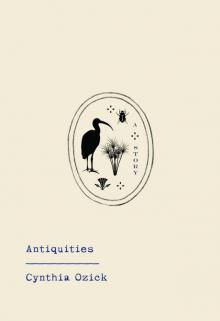 Antiquities
Antiquities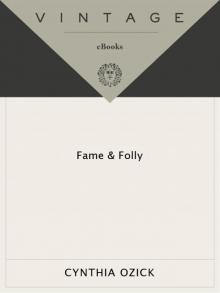 Fame & Folly
Fame & Folly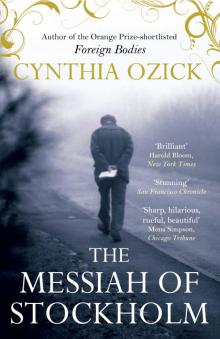 The Messiah of Stockholm
The Messiah of Stockholm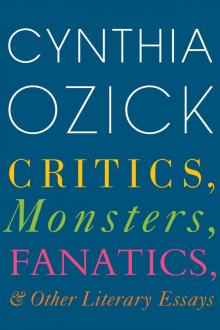 Critics, Monsters, Fanatics, and Other Literary Essays
Critics, Monsters, Fanatics, and Other Literary Essays Heir to the Glimmering World
Heir to the Glimmering World The Din in the Head
The Din in the Head Dictation
Dictation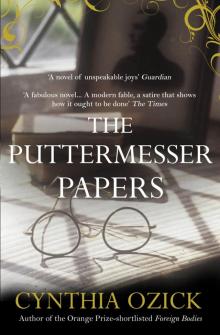 The Puttermesser Papers
The Puttermesser Papers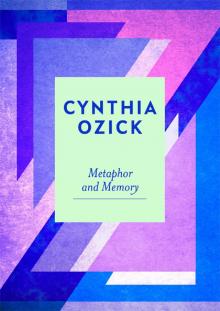 Metaphor and Memory
Metaphor and Memory Art and Ardor
Art and Ardor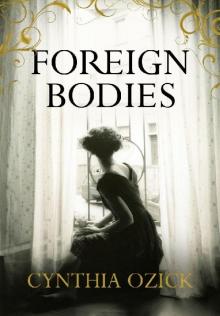 Foreign Bodies
Foreign Bodies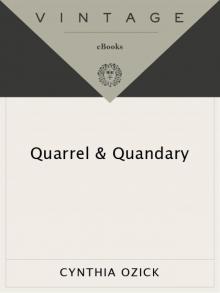 Quarrel & Quandary
Quarrel & Quandary